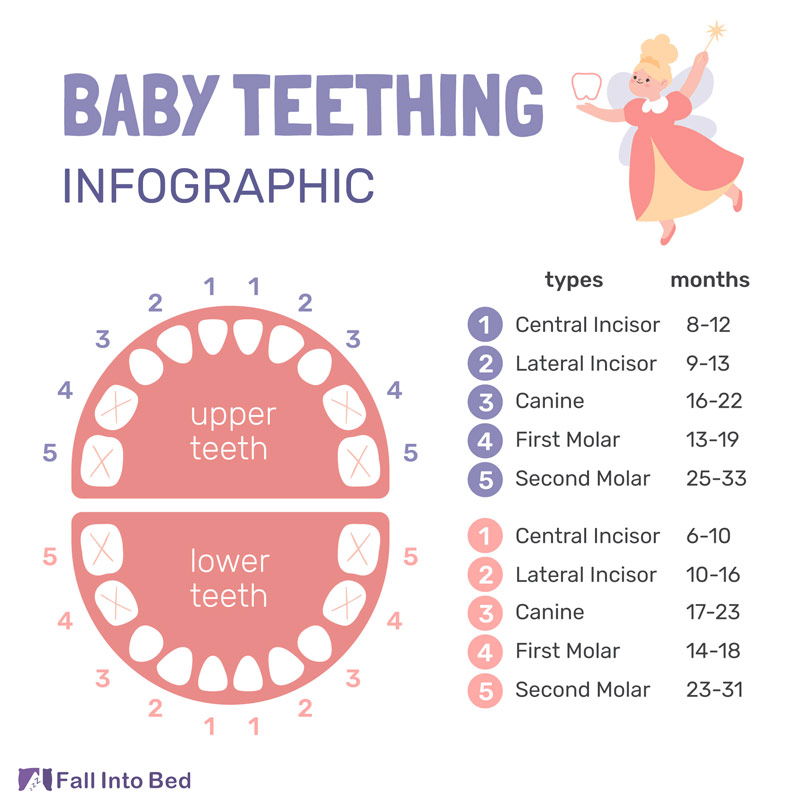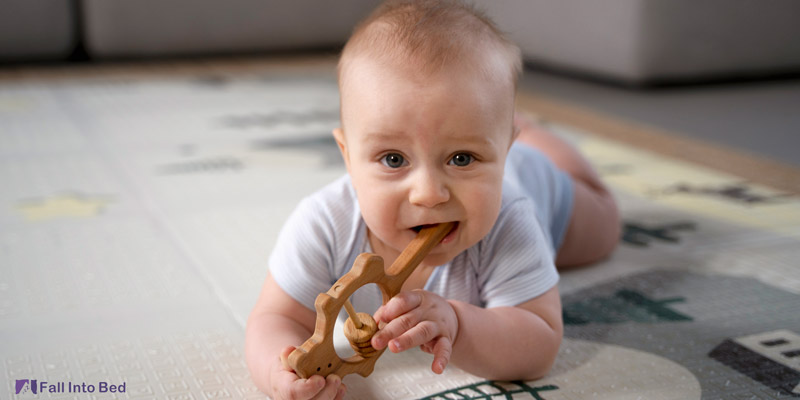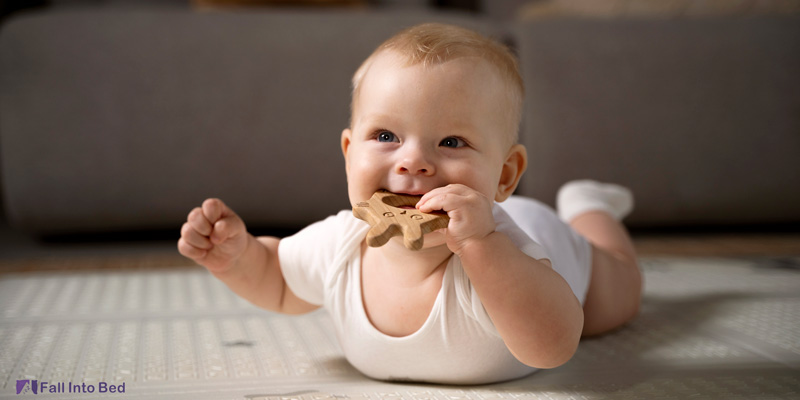The teething process can be very frustrating for your baby and sometimes even for you as the parent. It might mess with some of your baby’s daily routine like eating and sleeping. Some say that teething can make babies to sleep more than before, and even though it might sound strange due to the pain and discomfort your little one is in, it can be in some ways true. So, stay tuned to find out the effect of teething on sleep.
When do babies start teething?
Well, when it comes to teething, each baby can be different. But generally, babies start to grow out their first tooth in their first year. Some of them start around month 4 and for some, it might take 11 to 12 months to get their first tooth.

Can your baby’s sleep be affected by teething?
Short answer is: Yes. The process of teething in babies can be very exhausting and painful due to the changes and growth in their mouth. But even though there is no doubt that teething can affect your new-born’s sleep, the changes are different for every baby.
The discomfort during this time can interrupt your baby’s sleep and make it hard for them to fall back to sleep. And so, this can decrease your little one’s sleep time and add to their fuss in this time. check out this article to learn how to put your baby to sleep in 40 seconds.
However, this difficult times of not being able to sleep or waking up during their sleep, can be very tiring for some babies. And this can make them sleep more than before to fight the exhaustion of this uncomfortable process.
Do babies sleep more when teething?
As we mentioned, it’s possible for some babies to sleep more than before when teething, due to the feeling of exhaustion of the process, or the disruption of their normal routine, as they try to adapt to the changes.
Other reasons your baby could suddenly start sleeping more
Teething isn’t the only reason that can disturb your baby’s precious sleep time. Other factors can play a role in making your baby to suddenly start sleeping more than before;
1. Illness or recovery
If your baby is sick or in recovery from a recent illness, it’s normal for them to sleep more than before to help their body in their healing process.
2. Developmental milestones
Babies’ brains grow quickly in the first years of their life. And this process usually takes energy to reach the milestone that their development needs. This process can increase the amount of sleep your baby needs in those specific times.
3. Changes in routine or environment
Any change in your baby’s daily routine like travelling, starting day-care or moving to a new house can change their sleep pattern. Your baby might need more sleep to adjust to the new situation and environment.
4. Overstimulation
Keeping babies occupied with different games while there is so much noise and stimuli in the environment, can make your baby mentally tired and overstimulated. The body try to compensate for the energy loss by sleeping more than normal.
Other signs of teething
Other than changes in sleep schedule, teething has other symptoms as well that can affect your baby’s routine life and make them fussier than before:
- Increased drooling. Teething can stimulate saliva production.
- Swollen and sore gums. They might look swollen tender and red.
- More irritated than usual
- Chewing and biting on objects
- Some changes in eating habits. teething might lead to a decrease in appetite.
- A mild fever (less than 100.4°F or 38°C)
- Facial rash or flushed cheeks

By knowing the signs of this process, we can understand the needs of our baby better and help them to have an easier experience.
Ways to ease your baby’s pain during teething before sleep
1. Gum massage
Use a clean finger to gently rub on your baby’s gum to relieve the pressure caused by teething.
2. Teethers and soothers
You can find so many different teethers and teething rings in texture, and most of them have the ability to cool in freezer to sooth the gum. It’s better to get teethers made of rubber, silicon or plastic than wood as they can injure the gum. there are also teething blankets and crib teething guards that are very helpful for your baby, especially during their sleep.

3. Cold food
If your baby eats solid, cold food can relieve some discomfort on their gum. You can give them yoghurt, applesauce and such cold foods.
4. Comfort and cuddle
Sometimes all your baby needs is comfort and love from you in their teething process. Offer plenty of cuddles and attention to calm your little one to help them with this challenging time.
Also, makes sure your baby is in a comfortable and safe sleeping position. Especially if they’re younger than 12 months of age, the wrong position can increase the chance of sudden infant death syndrome (SIDS).
Teething can be tough for your baby. With gaining more knowledge about this process and ways to make it less uncomfortable, you can make this process a lot easier for your sweet baby. And soon you’ll have a cute little angle with teeth!
Sweet teething dreams!








